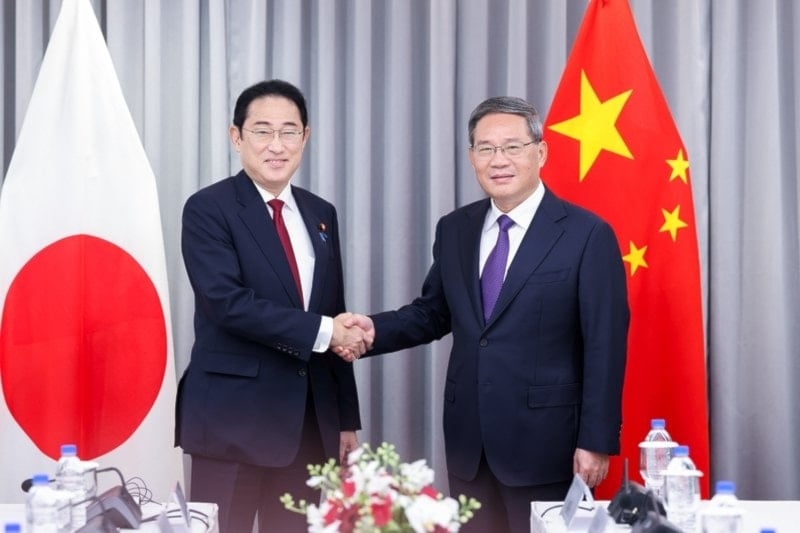China seeks stable, productive relations with Japan: Premier Li Qiang
Premier Li mentioned the importance of Japan fulfilling its obligations regarding the water released from the Fukushima Daiichi nuclear power plant (NPP).
-

Chinese Premier Li Qiang and Japanese Prime Minister Fumio Kishida ahead of their first official meeting, in Seoul on Sunday (@AmbXieFeng)
Chinese Premier Li Qiang on Sunday voiced Beijing's readiness to foster constructive and stable relations with Japan, aligning with the needs of the new era.
"We hope that Japan will work together with China to move toward each other and build a constructive and stable China-Japan relationship that meets the requirements of the new era," Li was quoted as saying by the state-run China Central Television.
Li also urged Tokyo to handle the Taiwan issue appropriately as separatism in Taiwan has been posing a serious risk to China's domestic security.
Japanese Prime Minister Fumio Kishida echoed the sentiment of mutual benefit, noting that constructive and stable relations between the two nations benefit not only them but the entire world.
Elsewhere in his remarks, Premier Li also mentioned the importance of Japan fulfilling its obligations regarding the water released from the Fukushima Daiichi nuclear power plant (NPP).
"The issue of discharging radioactively contaminated water from the Fukushima Daiichi nuclear power plant into the sea concerns the health of all mankind," Li said.
Read more: Japan's TEPCO says new contaminated leak found from Fukushima NPP
China and Japan normalized their relations on September 29, 1972. This was marked by the signing of the Japan-China Joint Communique, which formally established diplomatic ties between the two countries.
Prior to the normalization, their relations were often described as hostile, especially due to the long years of war and aggression that preceded the restoration of diplomatic ties.
Japan's invasion and occupation of large parts of China was especially bloody, as it led to widespread atrocities, such as the Nanking Massacre.
Despite normalization, Japan-China relations remain complicated by geopolitical forces, particularly the United States, with which Japan is aligned.
Recent developments have shown increased military tensions in the South China Sea.
On February 4, Japan and the US engaged in joint military drills in which China is designated as their hypothetical adversary. And in March, Japan's Ground Self-Defense Forces deployed its first surface-to-ship missile unit on the island of Okinawa.
Earlier this month, officials from Japan and South Korea visited to attend the inauguration of Lai Ching-te as President. Chinese embassies in both countries consecutively expressed opposition to the visits.
Read more: China opposes Japanese, South Korean lawmakers' visit to Taiwan

 3 Min Read
3 Min Read








